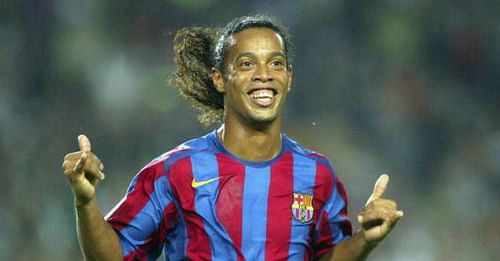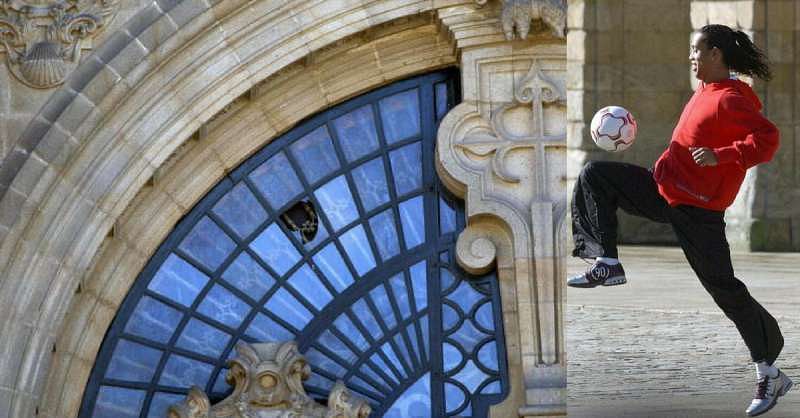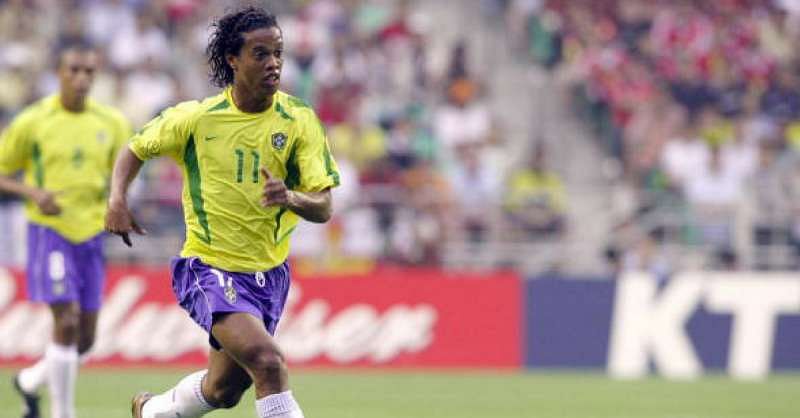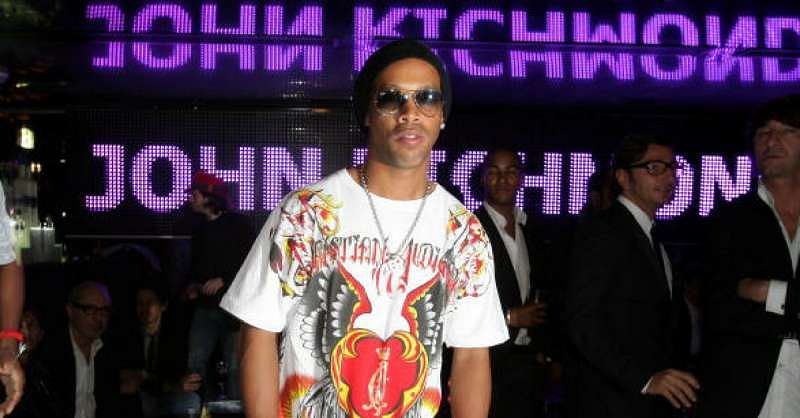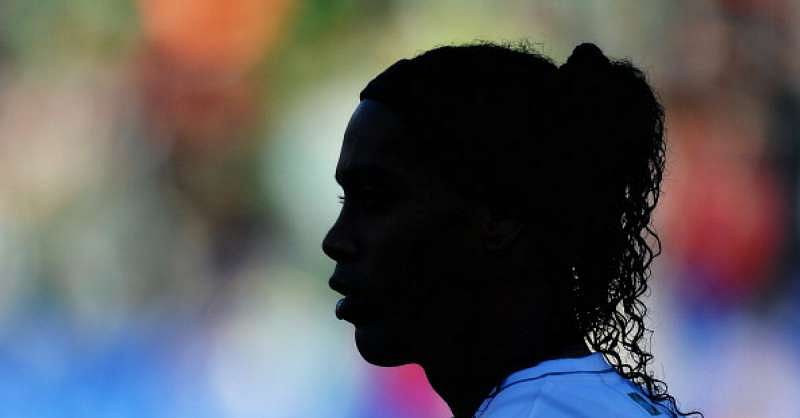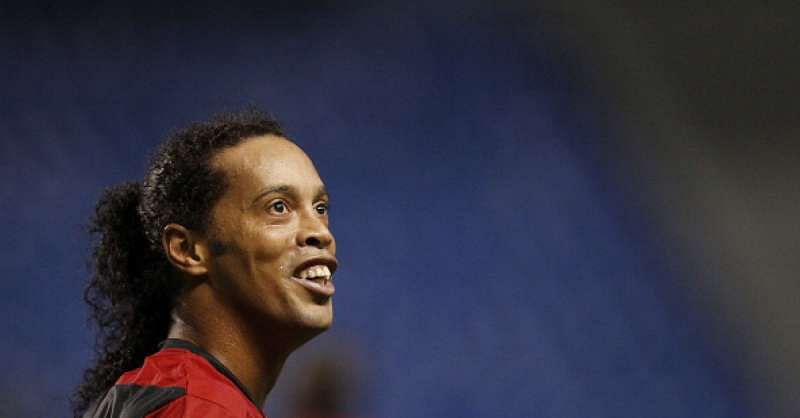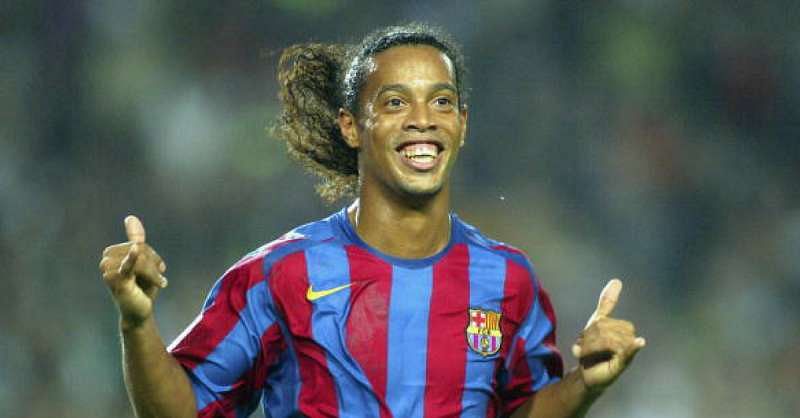
Ronaldinho: Football, Love, and the Discovery of Joy
*smash* *crack* *clang* How do you describe the sound of breaking glass? As the shattered pieces clinked and clanked (?) on their way down from the heights of the great Cathedral, a hush gathered over those assembled in front of it.
You see, since the early Middle Ages, devout Christians from across Europe have made their way across mountains and forests to venture deep into the heart of Galicia, far up in the northeast of Spain, to pay homage at the Catedral de Santiago de Compostela. Tradition has it that the remains of James, son of Zebedee (also known as Saint James the Great), one of the Twelve Apostles of Jesus Christ, are buried in the cavernous Cathedral.
And someone had just broken one of the holy shrine’s glass panes.
That someone had been doing kick-ups while climbing the stone steps that denote the end of the great pilgrimage of Camino de Santiago, or St. James Way, and had paused at the end of the steps to finish off with a bicycle kick – which had sent the ball crashing through the Cathedral’s famed facade.
Anyone who has ever gone to church, or studied in an institution administered by Catholic priests knew what was coming next... the Archbishop looked up, and then looked at the man responsible – stood there looking at the ground with a sheepish grin on his face – and asked him “Puedo tener tu autógrafo, por favor?”.
No admonishments, no harsh words, no anger... all the Archbishop had in riposte to the ‘crime’ was a smile and a humble request for an autograph. That’s the kind of effect that Ronaldinho had on people.
You couldn’t help but smile when he had the ball at his feet.
“You find love when you least expect to...
The first time I saw him play I was left wondering how in the hell he did it. His running style was unnatural – hair flying all over, his head going hither and his body thither, and yet he moved faster than anyone on the pitch. I could hear my Physical Education teacher’s words ring loud in my ears – “back straight, head still... that’s how you run fast” – but this guy here was doing the exact opposite.
When he had the ball, he moved even faster – and unlike most of the great dribblers I’d seen till then, the ball was not constantly tied to his laces, it was out there, seemingly out of his reach, seducing defenders out of their positions... teasing them, tantalising them... till he left them on their backsides with a sudden swerve of his hips.
It was unorthodox, it was impossible, and it was utterly brilliant.
It was 2002, the great Ronaldo was spearheading a Brazilian side in search of redemption and he was there, at the heart of it all, wearing no. 11, pulling strings and creating moves which Ronaldo and the under-appreciated Rivaldo finished off in such style. The game against England encapsulated everything he had – his dribbling creating the first goal for Rivaldo, and his outrageous imagination (and the skill to execute it) creating a second where there ought to have been none.
Then, after the World Cup, he dropped off the radar. Well, my radar at least – Ligue 1 is not the most televised football tournament in the world and growing up in an era when you could either use the telephone or go ‘online’, there wasn’t much I could do to follow him on the interwebs either.
However, a year later he was back, this time with his hair tied back in a ponytail... This time wearing the famous red and blue of Barcelona. Bucktoothed, dark, and lanky, he was not what you would describe as pretty... which is what inspired a Real Madrid honcho (reportedly a member of the Board of Directors) to tell El Pais’ Diego Torres...
"How ugly is Ronaldinho?! There was no point buying him, it wasn't worth it. He's so ugly that he'd sink you as a brand.
“Between Ronaldinho and Beckham, I'd go for Beckham a hundred times. Just look how handsome Beckham is, the class he has, the image. The whole of Asia has fallen in love with us because of Beckham.
“Ronaldinho is too ugly.”
… but when he got a football at his feet, he was beautiful.
His first goal for Barcelona gave the world a glimmer of what was to come over the next three years. Taking the ball well within his own half, he started running, ponytailed hair flying behind him as he covered the ground with that same unnatural pace that had stunned everyone in Japan/Korea.
A defender came lunging at him and was left kicking at thin air with little more than a shake of the hips before he took it past another with an exquisite piece of ball control. Still a good thirty, thirty-five yards from goal, he let it fly – without so much as breaking stride – and it hammered in off the crossbar... the playground players ultimate goal (remember just how sweet the ‘thwang’ of the ball hitting the crossbar as it went in was?).
That goal signalled the beginning of a fantastic time in which the city of Barcelona, the nation of Spain.. nay, the whole world fell head over heels in love – with the game, and with him. In those first three years, he was untouchable. There was nothing he couldn’t do.
He dribbled past entire defences on his own, he threaded the eye of the proverbial needle with passes that left even Xavi Hernandez open-mouthed (sometimes, even with his goddamn back) and he scored goals that most people could not even have thought possible.
He looked at the word ‘impossible’, laughed at it and then scissor-kicked it out of the dictionary.
He caught the ball on his chest off a throw-in and turned with it still there, leaving two Athletic Bilbao defenders standing there, gawking at him in shocked bewilderment. He caught the ball on his back – while running at full tilt – and got it to bounce onto his path. He shook off Gennaro Gattuso to score a left-footed ‘worldie’ at the San Siro. He broke through Jose Mourinho’s impregnable Chelsea defence with nothing more than a swivel of his hips and a poke of his toe. He bullied John Terry, physically bullied him.
He went to Estadio Santiago Bernabeu and made the Madrididistas stand up and applaud him.
He was the best player in the world, and everyone loved him. He was well and truly on the path of becoming the greatest ever...
… and lose it when you are sure it is in your grasp”
But then he got fed up. Or so it seemed. He stopped attending training, and he stopped caring. Never one to shy away from having a good time, his antics of the field moved from funny and entertaining to oh-my-good-lord-just-stop-it-will-you! as his tricks and flicks on the field moved from game-altering to a mere sideshow that made increasingly rare appearances.
There is this story about how Barcelona’s representatives had come to watch Ronaldinho play for PSG and had ended up catching up with him at Club Bikini, playing bongos on the stage while dressed in a giant mask. The first time I heard that story it had been hilarious, another brilliant anecdote in the life of a brilliant man who just couldn’t stop making us smile, but as he gained weight with every passing week and he started appearing in more commercials than football games, it took on a darker meaning and everything that his manager at PSG had said in his final year there started to make sense -
“Ronaldinho has a problem,” Luis Fernandez had said a few weeks into that season. “He does not perhaps have the hygiène de vie [lifestyle] of a top-level sportsman.
“But while I can control what goes on inside our training camp I cannot control what goes on outside it.”
The world’s thoughts echoed the sentiments of the Barca hierarchy – what was this guy doing with his life? Why didn’t he just buckle down and train? Why was he doing this... It was like Mario Puzo had gotten three-fourths of the way through The Godfather before finding himself so distracted that he had to up and start a cooking show telling everyone just how many tomatoes went into making the perfect spaghetti sauce.
For all the world it looked like he had fallen out of love with the game that he had made so many of us fall in love with... and it was painful to watch.
He wandered across the footballing landscape – AC Milan, Flamengo, Atletico Mineiro, Queretaro, Fluminense and even the faintly ridiculous Indian futsal league – and through all this he showed us brief flashes of his remarkable genius with the ball: A panna and rabona here, a piece of jaw-dropping ball control there, but mostly he walked through matches as though in a drunken stupor, merely running through the motions because he had to.
At Atletico Mineiro, he showed signs of getting back to somewhere near his best, but that – like so many others – was just another one of his seductive tricks. Stupid us for being seduced by the hope it dangled.
It’s that hope that meant that those flicks and tricks that had filled our hearts with joy were now simply breaking it.He was our lad, our shining beacon of joy and happiness and everything that is good with the world... He could still get it back... Get us back... Why was he doing this to himself?
Watching Ronaldinho had gone from becoming one of life’s greatest pleasures to one of its worst tortures. What Ruskin Bond had once said made so much sense now:
You find love when you least expect to, and lose it when you are sure that it is in your grasp
The Discovery of Joy
For the last few years I’d felt nothing but anger, and sorrow, when I thought of the man. And then it struck me.
Why? Why was I so angry? Why was the world so sad because of what Ronaldinho had done with his life? Is it our obsession to see a role-model in every larger-than-life figure we see, the inclination to live vicariously through them – enjoying their successes just as our own?
He didn’t ask to be made role-model, we thrust it upon him. He didn’t ask to be lived vicariously through – it is us who imposed it on him as we all sought to escape the mundane realities of our daily grind.
It’s not his fault.
To attribute his sporting decline to his party lifestyle and his unhealthy attitude is way too simplistic. To try and analyse the impact his father’s early death and the over-reaching hold his elder brother-turned-father-figure has had on him is insulting to the field of psychology and an even greater insult to the man and what he has lived through.
So instead of wondering what might have been, why not just reflect on just how rare a footballer he was? He played with an unorthodox freedom that bordered on the absurd, and it was such a pleasure to see someone simply letting his innate creativity flow through him. It wasn’t about how fast he could run or how high he could jump, it was simply about what he could do with the football.
He said it best himself (on the Players Tribune):
“Think about what Dad said, to play free and to just play with the ball. Play with joy. This is something that many coaches will not understand, but when you are on the pitch, you will never calculate.
Everything will come naturally. Before you have time to think, your feet have already made a decision.
Creativity will take you further than calculation”
It did.
He played football with a joy that was as infectious as that smile which was on his face all the time. He smiled when he nutmegged someone, he smiled when he was clattered into. He smiled when he scored a goal, he smiled when he missed one. Regardless of the situation, his utter happiness in being able to play the game of football was... f***... it was beautiful.
We were, I was, so caught up in the pursuit of a happiness that only winning (and thereby being the best) can bring that I failed to discover a far more pure emotion – Ronaldinho’s joy.
I recognise it now, I embrace it now. His imperfection is nothing to be scoffed at, it makes him more human, more relatable, more loveable than any of today’s ‘greats’ of the game.
It’s true, I miss the unpredictability, I miss the elasticos and the pannas, I miss that stupid wagging-the-thumb-and-the-little-finger celebration... It’s true, I miss Ronaldinho. But it is not sadness I feel when I think of him now, nor anger. For more than anything, I am grateful for him.
After all, he helped me discover joy
